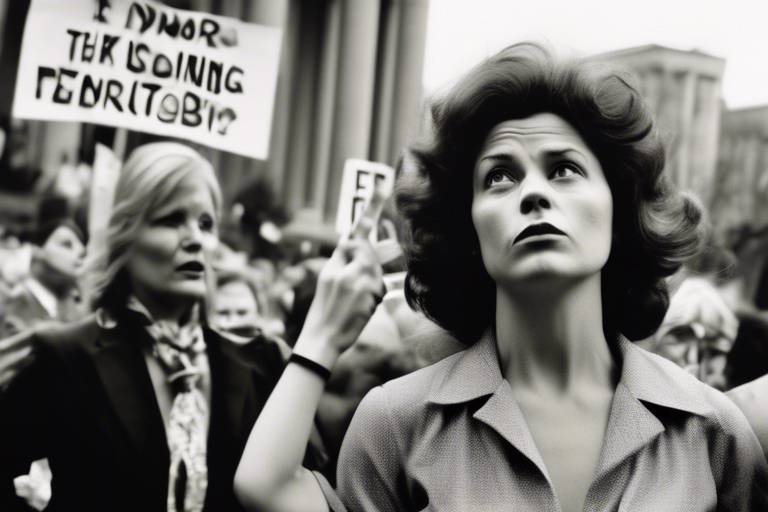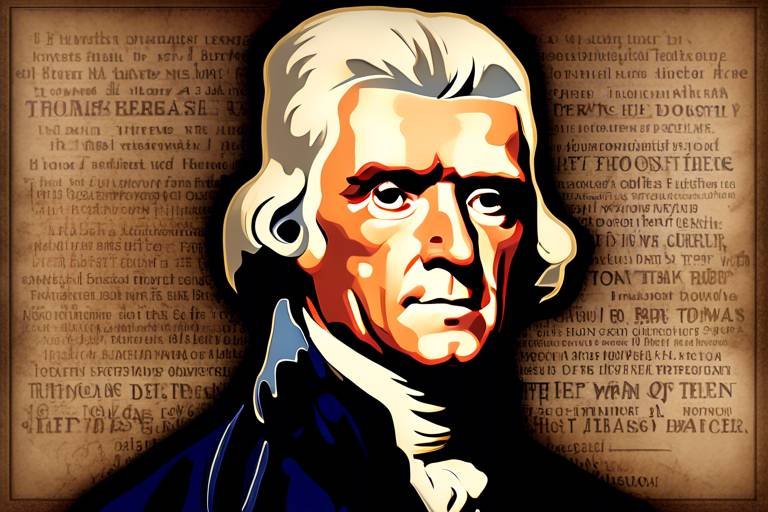The Philosophy of Conspiracy Theories in Politics
In today's political landscape, conspiracy theories have become a pervasive element, weaving through the fabric of public discourse like an insidious thread. These theories are not merely whimsical tales; they are deeply rooted in the psyche of society, often reflecting our collective fears and uncertainties. The philosophy of conspiracy theories in politics invites us to explore why these narratives resonate so strongly with individuals and how they shape our understanding of reality. From the shadows of history to the bright lights of social media, the journey of conspiracy theories is as complex as it is fascinating, revealing the intricate dance between belief, perception, and the political arena.
To truly grasp the impact of conspiracy theories on politics, we must first understand their origins. These theories often emerge in times of social upheaval or uncertainty, acting as a mirror reflecting the anxieties of the populace. Whether it's a government scandal, a public health crisis, or a controversial election, conspiracy theories provide a narrative that simplifies complex realities into digestible stories. They often suggest that hidden forces are at play, manipulating events behind the scenes, which can be both comforting and alarming. This phenomenon raises a crucial question: Why do we find solace in the idea that there are hidden explanations for the chaos around us?
The psychological appeal of conspiracy theories is another critical aspect to consider. People are naturally inclined to seek patterns and explanations, especially when faced with ambiguity. This need for clarity can lead to the adoption of conspiracy theories as a way to make sense of a confusing world. The interplay of cognitive biases—such as confirmation bias, where individuals favor information that supports their existing beliefs—fuels the persistence of these theories. Moreover, the concept of cognitive dissonance plays a significant role; when confronted with conflicting information, individuals may cling to conspiracy theories to reconcile their beliefs with reality, creating a psychological refuge from doubt.
Social identity theory further elucidates why conspiracy theories gain traction. Individuals often derive a sense of belonging and identity from the groups they associate with, and when a group endorses a conspiracy theory, it can reinforce members' beliefs. This dynamic creates a strong in-group/out-group mentality, where dissenting views are dismissed, and loyalty to the group becomes paramount. As members of a group rally around a shared belief, they may become more entrenched in their views, making it increasingly challenging to engage in constructive dialogue about the issues at hand. This phenomenon raises the stakes in political discourse, as the divide between "us" and "them" deepens.
The role of media in perpetuating conspiracy theories cannot be overstated. In an age where information is readily available at our fingertips, both traditional and social media platforms serve as conduits for these narratives. The sensational nature of conspiracy theories often garners clicks and shares, creating a feedback loop that normalizes these ideas within public discourse. As we scroll through our feeds, we encounter a barrage of information, and the algorithms designed to keep us engaged often prioritize sensational content over factual reporting. This raises the question: Are we, as consumers of media, inadvertently fueling the fire of conspiracy theories by engaging with them?
The intersection of conspiracy theories and political movements is another area ripe for exploration. Throughout history, we can identify numerous instances where conspiracy narratives have mobilized groups, influencing political outcomes in significant ways. From the rise of populist movements to the polarization of political parties, conspiracy theories have often been at the forefront, shaping ideologies and rallying supporters around a common cause. The implications of this trend are profound, as they can lead to real-world consequences, including protests, legislative changes, and shifts in public policy.
However, the impact of conspiracy theories extends beyond mere political mobilization; they can also erode public trust in essential institutions. As belief in conspiracy theories spreads, skepticism towards government, media, and scientific communities grows. This distrust can create a vicious cycle, where individuals become increasingly isolated in their beliefs, further alienating them from mainstream sources of information. The challenge lies in addressing this erosion of trust while fostering a more informed and engaged citizenry.
Finally, we must consider the relationship between conspiracy theories and political polarization. As these theories gain traction, they often exacerbate divisions within society, leading to a fragmented political landscape. The emergence of echo chambers—where individuals are only exposed to information that reinforces their beliefs—can create a challenging environment for constructive dialogue. In this context, conspiracy theories become not just a fringe belief but a central tenet of political identity, complicating efforts to bridge divides and foster understanding.
- What are conspiracy theories? Conspiracy theories are beliefs that suggest events or situations are secretly manipulated by powerful groups, often without substantial evidence.
- Why do people believe in conspiracy theories? People may believe in conspiracy theories due to cognitive biases, a need for control, social identity, and the desire to make sense of complex events.
- How do conspiracy theories affect politics? They can influence political movements, erode trust in institutions, and contribute to societal polarization.
- What role does media play in conspiracy theories? Media, especially social media, can amplify conspiracy theories, making them more visible and acceptable within public discourse.

The Origins of Conspiracy Theories
Understanding where conspiracy theories originate is crucial to unraveling their impact on political discourse. These theories don’t just appear out of thin air; they often emerge from a complex interplay of historical contexts, societal factors, and psychological needs. Throughout history, there have been pivotal moments that have fueled the flames of conspiracy thinking. For instance, during times of social upheaval, such as wars or economic crises, people tend to seek explanations that make sense of their chaotic environments. This quest for understanding often leads to the creation of narratives that blame unseen forces for their plight.
One significant factor contributing to the rise of conspiracy theories is the natural human tendency to find patterns in randomness. When faced with uncertainty, individuals may gravitate towards these theories as a way to impose order on the chaos. For example, the assassination of political figures has often sparked widespread speculation about hidden agendas and shadowy organizations. The assassination of President John F. Kennedy in 1963 is a prime example, where numerous conspiracy theories emerged, suggesting everything from government involvement to extraterrestrial intervention.
Moreover, conspiracy theories often reflect deeper societal anxieties. They can serve as a coping mechanism for individuals who feel powerless in the face of larger societal forces. When people perceive their world as threatening or unjust, conspiracy theories can offer a sense of control. This phenomenon can be seen in various historical events, such as:
- The Watergate scandal, which led to widespread distrust in government.
- The rise of anti-vaccine movements, fueled by fears of pharmaceutical companies.
- The 9/11 attacks, which spawned numerous theories about government complicity.
Interestingly, the origins of conspiracy theories can also be traced back to cultural narratives and folklore. Many societies have long-standing myths and stories that involve secret societies or hidden truths. These narratives often serve as cautionary tales, warning against the dangers of unchecked power or the need for vigilance against perceived threats. As such, conspiracy theories can be seen as modern iterations of these age-old stories, adapted to fit contemporary fears and anxieties.
In conclusion, the origins of conspiracy theories are deeply rooted in historical, psychological, and cultural contexts. They reflect a human desire to make sense of the world and to find explanations for the inexplicable. By understanding these origins, we can better navigate the complex landscape of political discourse and the role that conspiracy theories play within it.

The Psychological Appeal
When we dive into the murky waters of conspiracy theories, we quickly realize that their allure isn't merely a product of wild imagination or lack of information. Instead, these theories tap into fundamental aspects of human psychology, providing a sense of understanding and control in a world that often feels chaotic and unpredictable. Have you ever wondered why some people cling to these narratives even in the face of overwhelming evidence? It's a fascinating phenomenon that intertwines various psychological mechanisms, making conspiracy theories incredibly potent.
One of the most significant factors at play is cognitive dissonance. This psychological concept describes the mental discomfort experienced when an individual holds two or more contradictory beliefs, values, or ideas. For instance, if someone learns that their favorite political figure has made a controversial decision, they may experience discomfort because this contradicts their positive perception of that person. To alleviate this discomfort, some individuals might turn to conspiracy theories, adopting them as a means of reconciling their conflicting beliefs. Instead of accepting the uncomfortable truth, they create a narrative that fits their worldview, no matter how implausible it may seem.
Additionally, social identity theory plays a crucial role in the psychological appeal of conspiracy theories. This theory suggests that a person’s self-concept is partially derived from their group memberships. When individuals align themselves with a group that endorses specific conspiracy theories, they not only find camaraderie but also a reinforced sense of identity. This group dynamic fosters an “us versus them” mentality, where the in-group feels validated and superior, while the out-group is dismissed or vilified. The need to belong can be so powerful that it overshadows logical reasoning, making it easier for individuals to adopt and defend conspiracy theories.
Moreover, we can't overlook the impact of confirmation bias, a cognitive bias that compels individuals to seek out information that supports their pre-existing beliefs while ignoring contradictory evidence. This bias is a significant driver behind the persistence of conspiracy theories. When someone believes in a particular narrative, they will actively search for articles, videos, or testimonials that reinforce that belief, creating an echo chamber that makes it increasingly difficult to challenge or debunk the theory. For example, if a person believes that a government agency is involved in a cover-up, they might only read news sources that support this notion, further entrenching their view and dismissing any opposing arguments as propaganda.
These psychological mechanisms create a perfect storm for the proliferation of conspiracy theories. They offer individuals a way to make sense of complex social issues, providing simple explanations for events that seem bewildering. In a world where uncertainty reigns, conspiracy theories can feel like a lifeline, granting believers a sense of control and understanding. As we continue to explore the implications of these theories in the realm of politics, it's crucial to recognize the psychological underpinnings that make them so appealing.
- What are conspiracy theories? Conspiracy theories are beliefs that events or situations are secretly manipulated behind the scenes by powerful forces, often without credible evidence.
- Why do people believe in conspiracy theories? People may believe in conspiracy theories due to psychological factors such as cognitive dissonance, social identity, and confirmation bias, which help them make sense of complex realities.
- How do conspiracy theories impact society? Conspiracy theories can erode public trust in institutions, contribute to political polarization, and create divisions within society.

Cognitive dissonance is a fascinating psychological phenomenon that occurs when individuals experience a clash between their beliefs and the information they encounter. Imagine standing at a crossroads, where one path represents your long-held beliefs and the other leads to new, conflicting information. This internal conflict can be quite unsettling, prompting individuals to seek resolution in various ways. Often, people will embrace conspiracy theories as a means to reconcile this dissonance. For example, when faced with overwhelming evidence that contradicts their worldview, rather than adjusting their beliefs, they might turn to conspiracy theories that align with their existing views, providing a comforting narrative that makes sense of the chaos around them.
This tendency to adopt conspiracy theories can be likened to wearing a pair of rose-tinted glasses; they filter out uncomfortable truths and allow individuals to see the world through a lens that feels safer and more familiar. The process of rationalization becomes a coping mechanism, enabling people to maintain their self-image and worldview despite contradictory evidence. It’s like trying to fit a square peg into a round hole; instead of acknowledging the peg doesn't fit, one might simply insist that the hole is the problem.
Research has shown that cognitive dissonance can lead to a variety of responses. Here are some common ways individuals deal with this psychological discomfort:
- Denial: Refusing to accept new information that contradicts existing beliefs.
- Rationalization: Creating justifications for why the conflicting information is flawed or misleading.
- Selective Exposure: Actively seeking out information that supports pre-existing beliefs while avoiding contradictory evidence.
These responses are not merely reactions; they are deeply rooted in our need for consistency and control. When individuals face dissonance, it can feel like their mental world is crumbling, and conspiracy theories provide a scaffold to rebuild that world in a way that feels more stable. This psychological mechanism is particularly potent in political discourse, where the stakes are high, and beliefs about governance, society, and morality are often intertwined with personal identity.
In the realm of politics, cognitive dissonance can lead to a dangerous cycle. As individuals cling to conspiracy theories, they may become more entrenched in their beliefs, creating echo chambers where dissenting views are not only unwelcome but actively attacked. This polarization can further exacerbate societal divisions, as groups become more insular, reinforcing their beliefs through shared narratives that dismiss outside perspectives. Ultimately, understanding cognitive dissonance is crucial for unpacking why conspiracy theories hold such sway in political conversations, and why they can be so resilient against debunking efforts.
- What is cognitive dissonance? Cognitive dissonance is a psychological phenomenon where individuals experience discomfort due to conflicting beliefs or information.
- How does cognitive dissonance relate to conspiracy theories? Individuals may adopt conspiracy theories to resolve the discomfort caused by conflicting information that challenges their existing beliefs.
- Can cognitive dissonance lead to political polarization? Yes, cognitive dissonance can contribute to political polarization as individuals become more entrenched in their beliefs and less open to opposing viewpoints.

Social Identity Theory is a fascinating concept that dives deep into how we perceive ourselves and others based on group memberships. Imagine walking into a room filled with people who share your interests, beliefs, or backgrounds. Instantly, you feel a sense of belonging, a connection that can be both comforting and empowering. This is the essence of social identity—it's how we define ourselves in relation to the groups we associate with, be it political affiliations, cultural backgrounds, or even fandoms. When it comes to conspiracy theories, this theory becomes particularly illuminating.
Individuals often find solace in groups that endorse conspiracy theories, as these communities provide a shared narrative that validates their suspicions about the world. For instance, consider a person who feels alienated by mainstream political discourse. They might stumble upon a group that believes in a radical conspiracy theory, offering them a sense of purpose and identity. Suddenly, they are not just an observer; they are part of a collective that claims to see the "truth" that others are blind to. This sense of belonging can be intoxicating, as it reinforces their beliefs and makes them feel special, even chosen.
Moreover, the dynamics of in-group and out-group can intensify these beliefs. When conspiracy theorists categorize themselves as the enlightened few, they simultaneously label others—those who don’t subscribe to their beliefs—as misled or even complicit in the supposed deception. This creates a stark division that can be incredibly powerful. The more one identifies with a group that promotes conspiracy theories, the less likely they are to entertain opposing viewpoints. In essence, the group becomes a shield against cognitive dissonance, allowing individuals to reject any information that contradicts their beliefs.
To illustrate this point, let’s consider a few key elements of Social Identity Theory in relation to conspiracy theories:
| Element | Description |
|---|---|
| In-group bias | The tendency to favor one’s own group over others, leading to a stronger belief in the group’s conspiracy theories. |
| Out-group derogation | The tendency to view outsiders negatively, often labeling them as ignorant or part of the conspiracy. |
| Group cohesion | The bonds formed within the group can strengthen belief in shared conspiracy theories, making them more resilient to challenge. |
This social dynamic can create a feedback loop: the more individuals engage with their group, the more entrenched their beliefs become. It’s a classic case of “echo chambers,” where information is amplified and reinforced within the group, while dissenting voices are silenced or dismissed. This phenomenon not only solidifies their belief in conspiracy theories but also fosters a culture of mistrust towards anyone who questions their narrative.
In conclusion, Social Identity Theory provides a compelling lens through which we can understand why conspiracy theories thrive in certain social contexts. By emphasizing the importance of group dynamics, we can begin to unravel the complex motivations behind why individuals cling to these often outlandish narratives. It’s not just about the theories themselves; it’s about the community, the identity, and the sense of belonging that comes with them.
- What is Social Identity Theory?
Social Identity Theory explains how individuals define themselves based on their group memberships and how this affects their perceptions and behaviors. - How do conspiracy theories relate to Social Identity Theory?
Conspiracy theories often provide a sense of belonging to individuals who feel alienated, reinforcing their beliefs through group dynamics. - What is an echo chamber?
An echo chamber is a situation where beliefs are amplified and reinforced within a group, leading to a lack of exposure to differing viewpoints. - Can understanding Social Identity Theory help combat conspiracy theories?
Yes, by addressing the underlying social dynamics, we can create strategies to engage with individuals more effectively and encourage critical thinking.

Confirmation bias is a fascinating psychological phenomenon that plays a crucial role in how individuals form and maintain their beliefs, particularly in the context of conspiracy theories. Imagine you're wearing a pair of tinted glasses that only allow you to see certain colors; that's how confirmation bias works. It leads people to favor information that confirms their preexisting beliefs while disregarding or discounting information that contradicts them. This bias is not just a quirk of human nature; it's a powerful force that can shape our understanding of the world and influence our political views.
When it comes to conspiracy theories, confirmation bias creates an echo chamber effect. Individuals who believe in a particular conspiracy theory actively seek out information that supports their views, often gravitating towards sources that reinforce their beliefs. For instance, if someone believes that a secretive group is controlling world events, they will likely consume media and engage with communities that echo this sentiment. This behavior leads to a self-perpetuating cycle where the individual becomes increasingly entrenched in their beliefs, making it challenging to introduce alternative perspectives. The more they seek out confirming information, the more convinced they become of the conspiracy's validity.
Moreover, confirmation bias can manifest in various ways, including:
- Selective Exposure: People tend to expose themselves to information that aligns with their beliefs while avoiding contradictory information.
- Interpretation Bias: Individuals may interpret ambiguous evidence as supportive of their beliefs, even if the evidence is neutral or contradictory.
- Memory Bias: People are more likely to remember information that supports their beliefs and forget information that challenges them.
This bias is particularly dangerous in the realm of politics, where conspiracy theories can lead to significant societal consequences. When large groups of people embrace these theories, they can create a distorted view of reality that undermines rational discourse. As a result, critical thinking becomes clouded, and individuals may find themselves caught in a web of misinformation. This not only affects personal beliefs but can also have a ripple effect on public opinion and political landscapes.
In essence, confirmation bias acts as a filter through which individuals view the world, shaping their perceptions and beliefs in ways that can create division and misunderstanding. As we delve deeper into the complex interplay between conspiracy theories and political discourse, it's essential to recognize the role of cognitive biases like confirmation bias in shaping our understanding of reality.
- What is confirmation bias? Confirmation bias is the tendency to search for, interpret, and remember information in a way that confirms one’s preexisting beliefs.
- How does confirmation bias affect belief in conspiracy theories? It leads individuals to seek out and prioritize information that supports their conspiracy beliefs while ignoring contradictory evidence.
- Can confirmation bias be overcome? While challenging, awareness of one’s biases and actively seeking diverse perspectives can help mitigate confirmation bias.

The media landscape has undergone a seismic shift in recent years, fundamentally altering how conspiracy theories are disseminated and consumed. Traditional media outlets, once the gatekeepers of information, now share the stage with a plethora of social media platforms that allow anyone with an internet connection to become a broadcaster. This democratization of information, while empowering, has also led to a chaotic environment where misinformation can thrive. Have you ever scrolled through your social media feed and stumbled upon a sensational headline that made you stop in your tracks? That's the power of media at work, capturing attention and shaping perceptions.
One of the most significant impacts of media on conspiracy theories is its ability to amplify narratives. A single tweet or viral video can catapult a fringe idea into the mainstream, leading to widespread belief and discussion. For example, during major political events, conspiracy theories often gain traction as individuals seek to make sense of complex situations. The coverage of these events can either validate or debunk these theories, but the sheer volume of information available often makes it challenging for the average person to discern fact from fiction. In this context, the media not only informs but also influences public opinion, sometimes in ways that are detrimental to societal cohesion.
Furthermore, the algorithms that power social media platforms are designed to maximize engagement, often prioritizing sensational or controversial content. This can create echo chambers where individuals are repeatedly exposed to the same conspiracy theories, reinforcing their beliefs and making it increasingly difficult to challenge them. A study by the Massachusetts Institute of Technology found that false news stories are 70% more likely to be retweeted than true stories. This highlights the alarming potential of media to create a feedback loop, where conspiracy theories gain legitimacy simply through repetition.
Additionally, the role of media in shaping conspiracy theories is not limited to social media alone. Traditional news outlets can also play a part, whether through sensational reporting or by inadvertently giving credence to unfounded claims. The line between responsible journalism and sensationalism can sometimes blur, leading to a situation where conspiracy theories are reported in a way that legitimizes them. This phenomenon raises critical questions about the responsibility of media organizations in the age of misinformation.
To illustrate the impact of media on conspiracy theories, consider the following table that summarizes different media types and their influence:
| Media Type | Influence on Conspiracy Theories |
|---|---|
| Traditional News Outlets | Can either debunk or sensationalize conspiracy theories, influencing public perception. |
| Social Media Platforms | Facilitates rapid spread and normalization of conspiracy theories through user engagement. |
| Blogs and Forums | Provides a space for like-minded individuals to share and validate conspiracy beliefs. |
| Podcasts and Videos | Can reach niche audiences and promote conspiracy theories in an engaging format. |
In conclusion, the media plays a pivotal role in the lifecycle of conspiracy theories, from their inception to their widespread acceptance. As consumers of information, it is crucial for us to develop critical thinking skills and media literacy to navigate this complex landscape. The next time you encounter a conspiracy theory, ask yourself: where did this information come from? Who benefits from its spread? By questioning the narrative, we can begin to dismantle the influence of media on our beliefs.
- What are conspiracy theories? Conspiracy theories are beliefs that events or situations are secretly manipulated behind the scenes by powerful entities, often with little to no evidence to support them.
- How do media influence conspiracy theories? Media can amplify conspiracy theories by providing platforms for their dissemination, often prioritizing sensational content that captures attention.
- Why do people believe in conspiracy theories? Psychological factors such as cognitive dissonance, social identity, and confirmation bias contribute to the appeal of conspiracy theories.
- Can conspiracy theories impact political outcomes? Yes, conspiracy theories can mobilize groups, influence public opinion, and erode trust in political institutions.

Conspiracy theories have a significant and often surprising role in shaping political movements and ideologies. They serve as a lens through which individuals interpret complex political landscapes, often simplifying intricate issues into digestible narratives that resonate with their fears and hopes. For many, these theories provide a sense of **belonging** and **identity**, creating an "us versus them" mentality that can galvanize support for a cause. When a conspiracy theory takes root, it can act as a rallying cry, mobilizing individuals who feel disenfranchised or marginalized by mainstream political discourse.
Take, for example, the rise of various populist movements around the world. These movements often thrive on conspiracy theories that suggest elites are manipulating the system to the detriment of the average citizen. This notion can create a powerful emotional appeal, leading people to believe that they are part of a larger fight against an unseen enemy. In this context, conspiracy theories can transform political engagement from passive observation to active participation, as individuals feel compelled to take action against perceived injustices. The narrative that "they" are out to get "us" fosters a sense of urgency and purpose, driving individuals to engage in protests, rallies, and even more extreme forms of activism.
Moreover, conspiracy theories can also serve to legitimize political agendas. When a theory gains traction, it can be strategically employed by political leaders to justify their actions or policies. For instance, during election cycles, candidates may invoke conspiracy theories to discredit opponents or to rally their base. This tactic not only polarizes the electorate but also creates a fertile ground for misinformation, making it increasingly challenging for voters to discern fact from fiction. The result is a political landscape where conspiracy theories become intertwined with electoral strategies, leading to a **feedback loop** that reinforces both the theories and the political movements they support.
In examining specific case studies, we can observe how conspiracy theories have mobilized groups and affected political outcomes. For instance, the **Tea Party movement** in the United States was significantly influenced by conspiracy theories surrounding government overreach and the alleged hidden agendas of politicians. Similarly, the rise of **QAnon** has demonstrated how a conspiracy theory can evolve into a full-fledged political movement, with adherents actively participating in political rallies and supporting candidates who align with their beliefs. These examples illustrate how conspiracy theories do not merely exist in a vacuum; they are powerful tools that can shape political narratives and drive collective action.
Furthermore, the internet has amplified the reach and influence of conspiracy theories, allowing them to spread rapidly across social media platforms. This digital landscape enables like-minded individuals to connect, share information, and reinforce each other's beliefs, creating echo chambers that make it increasingly difficult to challenge or debunk these narratives. As conspiracy theories gain momentum online, they can infiltrate mainstream political discourse, further legitimizing their presence in the public sphere.
In conclusion, conspiracy theories are not just fringe beliefs; they are integral to understanding contemporary political movements. They reflect the anxieties and frustrations of individuals navigating a complex and often chaotic world. By analyzing the interplay between conspiracy theories and political movements, we can gain valuable insights into the dynamics of public opinion and the ways in which belief systems are constructed and maintained. As we move forward, it becomes crucial to address the impact of these theories on democratic processes and societal cohesion.
- What are conspiracy theories? Conspiracy theories are beliefs that events or situations are secretly manipulated by powerful groups or individuals, often without substantial evidence.
- How do conspiracy theories affect political movements? They can mobilize supporters, create in-group/out-group dynamics, and influence public perception and political agendas.
- Why do people believe in conspiracy theories? Factors such as cognitive dissonance, confirmation bias, and the need for social identity contribute to the appeal of conspiracy theories.
- What role does the media play in conspiracy theories? Both traditional and social media can amplify conspiracy theories, shaping public perception and normalizing these beliefs.

The influence of conspiracy theories on public trust is a topic that has gained significant attention in recent years. As these theories proliferate, they often lead to a profound erosion of trust in key institutions that are essential for societal cohesion. Think about it: when people start to believe that their government is hiding the truth, or that scientists are in cahoots with big corporations, it creates a ripple effect that can destabilize the very fabric of our society. This erosion of trust can be likened to a slow leak in a tire; it may not be immediately noticeable, but over time, it can lead to a complete breakdown.
One of the most alarming aspects of this phenomenon is how it can create a feedback loop. As trust in institutions declines, individuals may turn to alternative sources of information, often those that reinforce their existing beliefs. This can lead to a situation where conspiracy theories become self-perpetuating. For example, if a person believes that a particular health crisis is being exaggerated for political gain, they may seek out and share information that supports this view, further entrenching their beliefs and distancing themselves from mainstream perspectives.
Moreover, the impact of conspiracy theories on public trust extends beyond just individual beliefs; it can affect entire communities. When large groups of people begin to distrust the government or media, it can lead to a collective skepticism that undermines public health initiatives, electoral processes, and even emergency responses. In a world where misinformation spreads like wildfire, the stakes are incredibly high.
To illustrate this point, consider the following table that summarizes the relationship between conspiracy theories and public trust:
| Factor | Impact on Public Trust |
|---|---|
| Belief in Conspiracy Theories | Reduces trust in government and institutions |
| Alternative Information Sources | Reinforces existing beliefs, leading to further distrust |
| Community Skepticism | Undermines public health and safety initiatives |
It’s crucial to recognize that the decline in public trust isn’t just a theoretical concept; it has real-world consequences. For instance, during the COVID-19 pandemic, widespread conspiracy theories about the virus and vaccines led to significant vaccine hesitancy, jeopardizing public health efforts. This scenario underscores the urgent need to address the underlying factors that contribute to the rise of conspiracy theories and their impact on trust.
In conclusion, the relationship between conspiracy theories and public trust is complex and multifaceted. As we navigate an increasingly polarized world, fostering open dialogue and critical thinking becomes essential. By encouraging individuals to question the information they consume and to engage with differing perspectives, we can begin to rebuild trust in our institutions and counteract the damaging effects of conspiracy theories.
- What are conspiracy theories? Conspiracy theories are beliefs that events or situations are secretly manipulated behind the scenes by powerful actors.
- How do conspiracy theories affect society? They can erode trust in institutions, polarize communities, and lead to harmful behaviors.
- What can be done to combat conspiracy theories? Promoting media literacy, encouraging critical thinking, and fostering open dialogue are essential steps.

In today's world, the influence of conspiracy theories on political polarization is more pronounced than ever. These theories don't just exist in a vacuum; they thrive in environments where division is already present. When individuals subscribe to conspiracy theories, they often align themselves with a specific group, creating an us versus them mentality. This can lead to a dangerous cycle where the lines between fact and fiction blur, fueling further division among society.
One of the most striking aspects of conspiracy theories is their ability to reinforce existing beliefs and biases. When someone believes in a particular conspiracy, they are likely to seek out information that supports their views while dismissing contrary evidence. This phenomenon, known as confirmation bias, is crucial in understanding how conspiracy theories can deepen political divides. For instance, if a person identifies with a political party that promotes a conspiracy, they may become entrenched in that belief, viewing any opposing viewpoint as not just incorrect but as a threat to their identity.
Moreover, conspiracy theories often exploit societal fears and uncertainties. In times of crisis, such as during a pandemic or political upheaval, people may feel vulnerable and seek explanations that provide a sense of control. This vulnerability can make individuals more susceptible to conspiracy theories, which often offer simple, albeit misleading, narratives that blame specific groups or individuals for complex issues. As a result, the polarization between different political factions can intensify, leading to an environment where dialogue is replaced by hostility.
The impact of conspiracy theories on political polarization can be illustrated through recent events. For example, during the COVID-19 pandemic, various conspiracy theories emerged, attributing the virus's origins to specific countries or suggesting that it was a hoax orchestrated by powerful elites. These narratives not only fueled distrust in health authorities but also deepened divisions among political groups, with some embracing these theories while others vehemently opposed them.
In a world increasingly defined by social media, the spread of conspiracy theories has become easier and more rapid. Platforms like Facebook and Twitter can create echo chambers, where users are exposed primarily to information that aligns with their beliefs. This can lead to a heightened sense of polarization, as individuals become more entrenched in their views and less willing to engage with opposing perspectives. The result is a fragmented political landscape where compromise becomes increasingly difficult.
To combat this polarization, it's essential to foster open dialogue and critical thinking. Encouraging individuals to question the sources of their information and to engage with differing viewpoints can help break down the barriers created by conspiracy theories. However, this is easier said than done, as the emotional attachment to these beliefs can be profound. In many cases, challenging someone's deeply held beliefs can feel like an attack on their identity, further entrenching them in their views.
In conclusion, the relationship between conspiracy theories and political polarization is complex and multifaceted. As these theories continue to proliferate, they will undoubtedly play a significant role in shaping political discourse and societal dynamics. Addressing this issue requires a concerted effort from individuals, communities, and institutions to promote understanding, empathy, and critical engagement with the information we consume.
- What are conspiracy theories? Conspiracy theories are explanations for events or situations that involve secret plots by powerful actors, often contradicting the mainstream understanding.
- How do conspiracy theories contribute to political polarization? They reinforce existing biases, create in-group/out-group dynamics, and exploit societal fears, leading to deeper divisions among political factions.
- Can conspiracy theories be debunked? While it can be challenging, providing clear evidence and fostering open dialogue can help debunk conspiracy theories and encourage critical thinking.
- What role does social media play in the spread of conspiracy theories? Social media facilitates the rapid spread of conspiracy theories by allowing like-minded individuals to connect and share information, often in echo chambers.
Frequently Asked Questions
- What are conspiracy theories?
Conspiracy theories are beliefs that events or situations are secretly manipulated behind the scenes by powerful forces. They often arise from a distrust of official narratives and can be fueled by societal anxieties or historical contexts.
- Why do people believe in conspiracy theories?
People may believe in conspiracy theories due to cognitive biases, a need for control, and social identity. These psychological mechanisms help individuals make sense of complex events, especially when they feel uncertain or powerless.
- How do cognitive dissonance and conspiracy theories relate?
Cognitive dissonance occurs when individuals encounter conflicting information. To resolve this discomfort, they may adopt conspiracy theories as a way to align their beliefs with their perceptions of reality, often rejecting evidence that contradicts their views.
- What is social identity theory and its connection to conspiracy theories?
Social identity theory suggests that a person’s self-concept is influenced by their group memberships. When individuals belong to groups that endorse conspiracy theories, it can strengthen their beliefs and create a sense of belonging, reinforcing in-group/out-group dynamics.
- How does confirmation bias affect belief in conspiracy theories?
Confirmation bias leads individuals to seek out information that supports their existing beliefs while ignoring contradictory evidence. This bias makes conspiracy theories particularly resilient, as believers often filter information to reinforce their views.
- What role does media play in the spread of conspiracy theories?
Media, both traditional and social, plays a crucial role in shaping public perception of conspiracy theories. Sensational reporting, viral content, and echo chambers can normalize these theories, making them more prevalent in public discourse.
- How do conspiracy theories influence political movements?
Conspiracy theories can significantly impact political movements by mobilizing groups around shared narratives. They can also affect political outcomes by shaping public opinion and influencing voter behavior, sometimes leading to radicalization.
- What is the impact of conspiracy theories on public trust?
Widespread belief in conspiracy theories can erode public trust in institutions like government, media, and scientific communities. This skepticism can hinder effective communication and cooperation, making it challenging to address societal issues.
- How do conspiracy theories contribute to political polarization?
Conspiracy theories can exacerbate divisions within society, contributing to political polarization. As individuals align with groups that share their beliefs, it can create a fragmented political landscape, making dialogue and compromise increasingly difficult.



















